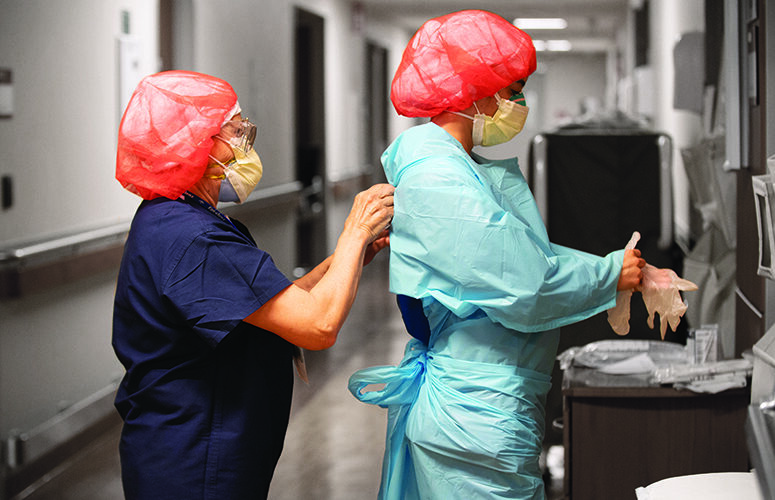
Collaborations Spark Innovation
Collaboratives between the state’s universities and healthcare systems continue to spark innovation in the life sciences and medical fields.
By Jim Pytell, Managing Editor On Jun 3, 2022New Jersey, often referred to as the “medicine chest of the world,” has garnered global recognition for its robust life sciences industry over the years. Recent innovations such as RUCDR Infinity Biologics pioneering the world’s first coronavirus saliva test and, separately, Johnson & Johnson creating its own COVID-19 vaccine, are prime examples of the major innovations that continue to come out of the Garden State.
But where does all of this innovation come from?
The state is home to numerous research universities and boasts many renowned healthcare systems, all of which are powerful standalone entities. However, an increase in cross-sector collaboration is opening the door to even more opportunity when it comes to breakthroughs, especially in the life sciences and healthcare.
One example of this is the New Jersey Alliance for Clinical and Translational Science (NJ ACTS).
Funded by the National Institutes of Health (NIH), NJ ACTS is a consortium coordinated by Rutgers Biomedical and Health Sciences (RBHS) and provides funding, training, resources and services to help researchers collaborate.
“NJ ACTS is an alliance partnership among Rutgers University, Princeton University and the New Jersey Institute of Technology (NJIT) in concert with the New Jersey Department of Health and industry partners,” says Reynold A. Panettieri, Jr., M.D., professor of medicine, Robert Wood Johnson Medical School, vice chancellor, clinical & translational science, director, Rutgers Institute for Translational Medicine & Science. “Virtually every RBHS School and Institute are involved.”
Translational science is defined as the multidisciplinary collaboration among scientists – including researchers, clinicians, biologists and members of the pharmaceutical industry – to advance research to address unmet medical needs.
Panettieri describes NJ ACTS as a “natural laboratory” for translational and clinical research.
“There has been a complete re-imaging of translational research into a matrix organization built on columns and rows that can facilitate, harmonize and streamline the research process. One person building a new widget in their lab – that could take years,” says Panettieri. “However, when you now have support from many different disciplines all helping that individual, those years can be turned into months.”
In what has been described by Rutgers President Jonathan Holloway as potentially the most meaningful and profound investment the state has ever made in translational research, The New Jersey Innovation and Technology Hub (HUB) is yet another example of a large-scale collaborative hub that embraces the matrix organization described by Panettieri.
The $665 million, 550,000-square-foot development in New Brunswick broke ground in October, and, once opened in 2024, will bring many New Jersey researchers from across sectors together under one “roof” to work side by side.
According to Alex Gorsky, chairman and CEO of Johnson & Johnson, the HUB’s impact will extend far beyond New Jersey’s borders.
“We recognize that transformational ideas come from everywhere, and the new discoveries and collaborations that will emerge from this hub will help change the trajectory of healthcare for patients worldwide,” Gorsky says.
It is also no accident that the HUB will be located amongst one of the region’s richest collections of innovative institutions.
“New Brunswick is ideally situated to host the innovation HUB due to its promise of being the premier academic medical center corridor in the region with its rich collection of higher education, healthcare and technology,” says Barry Ostrowski, CEO of RWJBarnabas, which will serve as one of the HUB’s core tenants.
Princeton University, Rutgers University, and Hackensack Meridian Health will also serve as core tenants at the site.
Another way to spur innovation is via new academic health systems, and earlier this year, Virtua Health and Rowan University announced their plans to create the Virtua Health College of Medicine & Health Sciences of Rowan University.
The new college will encompass the state’s only osteopathic medical school; an expanded nursing and allied health professions school; a new school of translational biomedical engineering and sciences; multiple new research institutes; and more.
Separately, Hackensack Meridian Health is launching a New Jersey Innovation Challenge to foster innovation and disruptive solutions from New Jersey’s businesses. The goal of the challenge is to add to the network’s comprehensive strategies to improve the patient experience and patient outcomes throughout the state by seeking to reduce 30-day readmissions for a number of ailments.
“We are challenging companies throughout New Jersey to play a role in helping us transform healthcare,’” says Robert C. Garrett, FACHE, Hackensack Meridian Health CEO. “The best ideas sometimes take fresh approaches from a wide array of perspectives.”
The momentum that New Jersey has created in building its reputation as hub for global life science, technology and medicine does not appear to be slowing down anytime soon.
A little over a year ago, The Cove in Jersey City was announced, which upon completion will be a mixed-use 13-plus acre campus comprising 1.4 million square feet of lab/tech office space as well as an equally large residential redevelopment, and a waterfront park.
The Cove’s integrated community is an ambitious endeavor, and will attempt to blur the line between laboratory spaces for academic institutions and commercial life science research and development.
While it will be some time before its completion, much like the HUB in New Brunswick, The Cove will add yet another global innovation ecosystem within the state.
These are just a few examples of how innovative research is taking place in New Jersey, but the theme across all of them is the importance of collaboration.
“If you put 10 scientists in a room from different disciplines, what they see is opportunity,” Panettieri says.
“New ideas are the way to drive progress, and New Jersey is at the forefront of pushing the envelope with innovation,” adds Ihor Sawczuk, M.D., FACS, president of Academics, Research and Innovation at Hackensack Meridian Health.
To access more business news, visit NJB News Now.
Related Articles:





